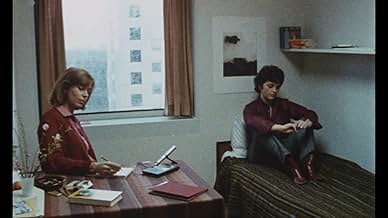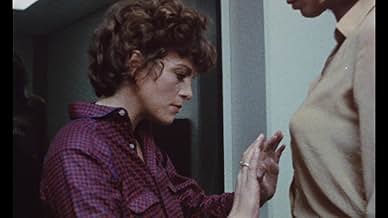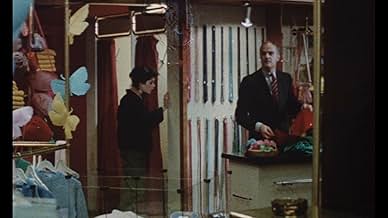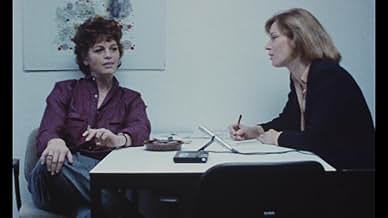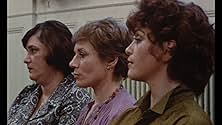IMDb-BEWERTUNG
6,7/10
1313
IHRE BEWERTUNG
Füge eine Handlung in deiner Sprache hinzuThree women of no previous acquaintance suddenly kill a male shopkeeper in the middle of the day. The female psychiatrist assigned to the case sets out to understand why.Three women of no previous acquaintance suddenly kill a male shopkeeper in the middle of the day. The female psychiatrist assigned to the case sets out to understand why.Three women of no previous acquaintance suddenly kill a male shopkeeper in the middle of the day. The female psychiatrist assigned to the case sets out to understand why.
- Auszeichnungen
- 3 Gewinne & 2 Nominierungen insgesamt
Eddie Brugman
- Echtgenoot
- (as Eddy Brugman)
Empfohlene Bewertungen
9SM-4
A Question of Silence is a moving film about three women who commit a horrible, violent crime and about the establishment's attempts to understand their motive. Without forethought and without knowing one another, they attack and kill a boutique owner in cold blood. The film follows the psychiatrist (played by Cox Habbema) as she interviews the incarcerated women. The major conflict comes from the women's refusal to state their motive, whence the title. Everyone assumes they must be insane, because to admit otherwise (and this is the conclusion to which the psychiatrist finally comes) is to admit that the world is a very bad place for women, indeed.
The film is hard to watch, especially, I would imagine, for men. But it by no means glorifies the murder or the murderers. Nor do the murderers find "overwhelming public support" at their trial. What they find is willful incomprehension on the part of the men who arrest them, try them and testify against them. Because what they have done cannot be understood in the context of any existing cultural system, including language, the women can only laugh as their sentence is pronounced. Their laughter is frightening, irrational and yet somehow gives shape to a different kind of logic.
The film is hard to watch, especially, I would imagine, for men. But it by no means glorifies the murder or the murderers. Nor do the murderers find "overwhelming public support" at their trial. What they find is willful incomprehension on the part of the men who arrest them, try them and testify against them. Because what they have done cannot be understood in the context of any existing cultural system, including language, the women can only laugh as their sentence is pronounced. Their laughter is frightening, irrational and yet somehow gives shape to a different kind of logic.
I just watched this film for a law class and wanted to briefly defend it, in light of the previously posted comment by another user.
I think the comparison of feminist reaction to male dominance in this movie, with anti-Semitism of the Nazi era, is inappropriate and not logically founded. Anti-Semitism and Jewish persecution in Nazi Germany was an example of social/religious bigotry, intolerance, and violence perpetrated by the political majority against a political and religious minority. It was based on a history of escalating persecution spanning centuries. By contrast, this movie concerns the emergent hostile sentiments of a social/political minority group, to their perceived oppression by the social/political majority.
The movie dates from the 1980's and perhaps both suffers and benefits from this fact -- it looks somewhat dated, but the social climate of that era is important to understanding the movie. Europe of the 1970s and 1980s, much like the US, was still very resistant to even the idea that sexism really existed or was a problem. The courts were actively fleshing out the parameters of sexual rights and protections -- legally carving out the nuances of sexual harassment, sex discrimination, and reproductive choice law.
The film is basically an extended commentary, arguably controversial, on the repression of women in a male dominated society. In this regard, the message is possibly too strongly stated -- three women, having finally had enough of silently accepting sexism and male domination, suddenly snap and brutally murder a male sales clerk in cold blood. They feel no remorse, and no men in the movie can even begin to comprehend the very idea of sexism or its effect on women. However, to compare the feminist sentiments of the film to Nazi-ism, is not only unfair, but is an offensive and reactionary over-statement of disagreement with these same feminist sentiments.
I think the comparison of feminist reaction to male dominance in this movie, with anti-Semitism of the Nazi era, is inappropriate and not logically founded. Anti-Semitism and Jewish persecution in Nazi Germany was an example of social/religious bigotry, intolerance, and violence perpetrated by the political majority against a political and religious minority. It was based on a history of escalating persecution spanning centuries. By contrast, this movie concerns the emergent hostile sentiments of a social/political minority group, to their perceived oppression by the social/political majority.
The movie dates from the 1980's and perhaps both suffers and benefits from this fact -- it looks somewhat dated, but the social climate of that era is important to understanding the movie. Europe of the 1970s and 1980s, much like the US, was still very resistant to even the idea that sexism really existed or was a problem. The courts were actively fleshing out the parameters of sexual rights and protections -- legally carving out the nuances of sexual harassment, sex discrimination, and reproductive choice law.
The film is basically an extended commentary, arguably controversial, on the repression of women in a male dominated society. In this regard, the message is possibly too strongly stated -- three women, having finally had enough of silently accepting sexism and male domination, suddenly snap and brutally murder a male sales clerk in cold blood. They feel no remorse, and no men in the movie can even begin to comprehend the very idea of sexism or its effect on women. However, to compare the feminist sentiments of the film to Nazi-ism, is not only unfair, but is an offensive and reactionary over-statement of disagreement with these same feminist sentiments.
Reminiscent of the play/short story/film, A Jury of her Peers, written by Susan Gaskel-a contemporary of Eugene O'Neill's who was way more popular than O'Neill at the time, much to O'Neill's dismay.
I'm not even sure if a DVD is available in North America, and if it isn't it would be a tremendous shame. "A Question of Silence" is a tough, rigorous, unsentimental and unblinking examination of justice and is, as another comment observed, a far less mainstream and safe film than Goriss's "Antonia's Line."
For anyone who has even a passing interest in dark, uncompromising work, go out of your way to find this film. It's a little wonky technically and there are perhaps 5 minutes or so of didactic twaddle one wishes the director has discarded in the cutting room- but none of this diminishes from the towering overall achievement.
For anyone whose taste runs to the safe and predictable and who doesn't like being provoked by the films they watch, avoid this one. It's not for you.
For anyone who has even a passing interest in dark, uncompromising work, go out of your way to find this film. It's a little wonky technically and there are perhaps 5 minutes or so of didactic twaddle one wishes the director has discarded in the cutting room- but none of this diminishes from the towering overall achievement.
For anyone whose taste runs to the safe and predictable and who doesn't like being provoked by the films they watch, avoid this one. It's not for you.
This film is NOT anti-male. It is not suggesting that women go out and randomly kill men just for being of that gender. What is does do is use a wonderful technique called reversal. If three men had brutalized a woman, well, "society" might not find that so shocking (maybe more now than earlier years, but certainly not as shocking as the reverse). It doesn't want to start propaganda, it wants to make you THINK. By making the therapist think on it, it forces the viewer to think on it as well. What's the history of women being brutalized and then remaining quiet about it? Have women really achieved the social, political, and economic equality that is the feminist goal? Why not? This movie doesn't hate men; it simply loves women enough to give everyone something to think about.
Wusstest du schon
- WissenswertesThe first plant that Nelly Frijda throws during her tantrum can be seen hitting the lens of the camera.
Top-Auswahl
Melde dich zum Bewerten an und greife auf die Watchlist für personalisierte Empfehlungen zu.
- How long is A Question of Silence?Powered by Alexa
Details
Box Office
- Budget
- 300.000 NLG (geschätzt)
Zu dieser Seite beitragen
Bearbeitung vorschlagen oder fehlenden Inhalt hinzufügen

